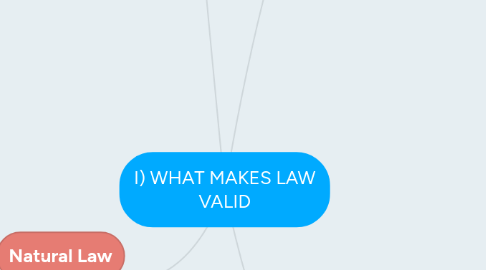
1. Natural Law
1.1. Principles of morality
1.1.1. Dworkin
1.1.1.1. Gives judges power to draw from judicial history that no institution has sanctioned to determine validity of law
1.1.2. Dyzenhaus
1.1.2.1. Judges should
1.1.2.1.1. Rely on fairness (morality embedded in law despite precedent)
1.1.2.1.2. Interpret statutes as if they were intended to meet standards of fairness
1.1.2.1.3. there can be unjust statutes which may need to be changed
1.1.2.1.4. Laws LEGITIMACY comes from:
1.2. Civil Disobedience
1.2.1. Greenawalt
1.2.1.1. Law illegitimate then CD justified
1.2.1.2. For CD to be morally acceptable
1.2.1.2.1. 1. Alternatives for changing law must have been persued
1.2.1.2.2. 2. the disobedience must conform to a commonly shared perception of justice (+ shouldn't interfere with other rights)
1.2.2. Raz
1.2.2.1. CD isn't justified in lib societies where people have a right to political participation (eg riots)
1.2.2.2. But.... even in lib societies unjust laws may be created and in certain circumstances, CD is justified
1.2.3. Cover
1.2.3.1. NOMOS
1.2.3.1.1. Nomos (narative
1.2.3.1.2. Jurisgenesis
1.2.3.1.3. Jurispathic
1.2.3.1.4. Test and contest of commitment
1.2.3.2. CD
1.2.3.2.1. The decision to act in accordance with an understanding of the law validated by the actor's own community but repudiated by the officialdom of the state (disobeying the interpretation of the state)
1.2.3.2.2. A claim of radical interpretation eg Black man sitting on bus
1.2.3.2.3. BUT when violence is added, the stakes of the interpretive enterprise are escalated
1.3. Inner morality of law
1.3.1. Fuller
1.3.1.1. GP PICARA
1.3.1.1.1. General
1.3.1.1.2. Published
1.3.1.1.3. Prospective
1.3.1.1.4. Intelligible
1.3.1.1.5. Consisten
1.3.1.1.6. Able to be complied with
1.3.1.1.7. Reasonably durable
1.3.1.1.8. Actually applied in fact
1.3.1.2. Laws not valid without GP PICARA as people would reject through CD
1.3.1.2.1. EG. 2009 Afghani govt adopted law requiring Shiite women to get permission from hubby to leave house. Large demonstrations and international opposition (violated women's HR). Kazai agreed to review the bill. CD = nailed it.
2. Marxist
2.1. Laws ARE oppressive/unjust
2.2. Critique of liberal legal though
2.3. Law DISGUISES its true intent through mystifying or ideological means
2.4. Law presents itself to subjects as a good thing... but its not. (dont be fooled)
2.5. Functional Role?
2.5.1. To preserve status quo and bolder ideology (red)
2.6. gives prominence to issues
2.6.1. repressive role of law
2.6.2. fundamentally political character
2.7. critique of Marx
2.7.1. Focuses too much on social group
2.7.2. view of law is too simplistic
2.7.3. pessimistic about capitalism disregarding benefits (eg technology etc)
3. Positivist
3.1. Hart
3.1.1. Compliance (internal): What makes people follow the law?
3.1.1.1. Social pressure is the primary way of enforcing rules
3.1.1.1.1. PRIMARY RULES
3.1.1.2. Power conferring rules
3.1.1.2.1. SECONDARY RULES
3.1.2. External: What is law?
3.1.3. Is there an obligation?
3.1.3.1. Obliged to act in a particular way where
3.1.3.1.1. rule requiring them to behave in a particular way (minimum content)
3.1.3.1.2. rule enforced by social pressure (primary rule)
3.1.3.1.3. rule satisfies secondary rules (RoR)
3.2. Waldron
3.2.1. 2nd rules complicate the system and thus
3.2.1.1. 1. risk central power being used for oppression
3.2.1.2. 2. increase likelihood that people will follow the law blindly
3.2.2. in asserting that there is no cure for the injustice of law, Hart actually offers a cure....
3.2.2.1. all people should be alert and active in the law
3.3. Austin/Bentham
3.3.1. Law = ?
3.3.1.1. Law = Command
3.3.1.1.1. Command = desire backed by force if necessary
3.3.1.1.2. ∴ all legal obligations created and upheld by SANCTIONS
3.3.1.2. Law = Positive phenomenon
3.3.1.3. Law = the rule of men who use it as an instrument for their power
3.3.2. 'existence of law is one thing, merit or demerit is another'
3.3.2.1. SEPERABILITY thesis: Law -/- morality
3.3.2.1.1. Laws with clear meaning are still laws
3.4. Hobbes
3.4.1. Pessemistic of human nature
3.4.2. purpose of law = maintaining conditions for social order amongst inherently evil human beings
3.4.3. law = command put forward by the sovereign backed by force
4. Evil Laws (Hart Fuller debataroo)
4.1. Hart
4.1.1. Attacked by Radbruch
4.1.1.1. Positivism had contributed to Nazi regime, argument used in Nuremburg trials
4.1.1.1.1. Nazi informed: claimed innocence as acts were legal under NAZI law
4.1.1.1.2. court held that the wife was guilty as the statute was 'contrary to the sound CONSCIENCE and sense of justice of all decent human beings'
4.1.1.2. Hart defends himself
4.1.1.2.1. Utilitarian solution (evil laws are not laws) is FLAWED
4.1.1.2.2. Minimum content: basic moral principles prohibiting violence/theft
4.1.1.2.3. Only if law failed to provide protection would the minimum be unsatisfied
4.2. Fuller
4.2.1. Accepts Hart's minimum but also establishes GP PICARA

